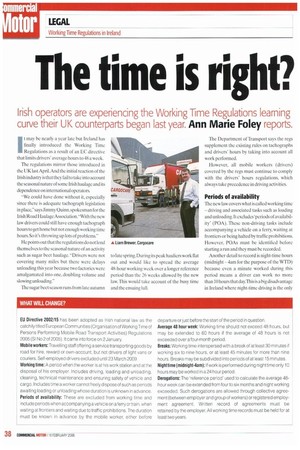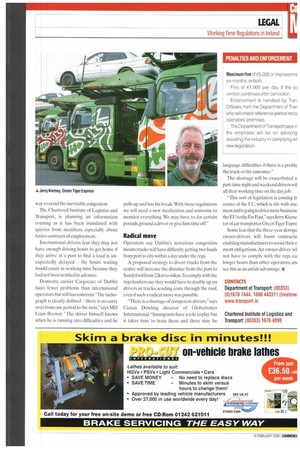The time is right?
Page 38

Page 39

If you've noticed an error in this article please click here to report it so we can fix it.
Irish operators are experiencing the Working Time Regulations learning curve their UK counterparts began last year. Ann Marie Foley reports.
II may be nearly a year late but Ireland has finally introduced the Working Time Regulations as a result of an EC directive that limits drivers' average hours to 48 a week.
The regulations mirror those introduced in the Ill( last April.And the initial reaction of the Irish industry is that they fail to take into account the seasonal nature of some Irish haulage and its dependence on international operators.
"We could have done without it, especially since there is adequate tachograph legislation in place," says J immy Ouinn,spokesman for the Irish Road Haulage Association."With the new law drivers could still have enough tachograph hoursto get home but not enough working time hours. So it's throwing up lots of problems."
He points out that the regulations do not lend themselves to the seasonal nature of an activity such as sugar beet haulage. -Drivers were not covering many miles but there were delays unloading this year because two factories were amalgamated into one, doubling volume and slowing unloading."
The sugar beet season runs from late autumn to late spring.Dun i ng its peak hauliers work flat out and would like to spread the average 48-hour working week over a longer reference period than the 26 weeks allowed by the new law. This would take account of the busy time and the ensuing lull. The Department of Transport says the regs supplement the existing rules on tachographs and drivers' hours by taking into account all work performed.
However, all mobile workers (drivers) covered by the regs must continue to comply with the drivers' hours regulations, which always take precedence in driving activities.
Periods of availability
The new law covers what is called working time driving and associated tasks such as loading and unloading. It excludes 'periods of availability' (POA). These non-driving tasks include accompanying a vehicle on a ferry, waiting at frontiers or being halted by traffic prohibitions. However. POAs must be identified before starting a run and they must be recorded.
Another detail to record is night-time hours (midnight 4am for the purpose of the WTD) because even a minute worked during this period means a driver can work no more than 10 hours that day.This isa big disadvantage in Ireland where night-time driving is the only
way to avoid the inevitable congestion.
The Chartered Institute of Logistics and Transport, is planning an information evening as it has been inundated with queries from members. especially about future contracts of employment.
International drivers fear they may not have enough driving hours to get home if they arrive at a port to find a load is unexpectedly delayed the hours waiting would count as working time because they had not been notified in advance.
Domestic carrier Cargocare of Dublin faces fewer problems than international operators hut still has concerns. "The tachograph is clearly defined there is no carry over from one period to the next," says MD Liam Brewer. "The driver himself know; when he is running into difficulties and hc
pulls up and has his break. With these regulations we will need a new mechanism and someone to monitor everything. We may have to. for certain periods, ground a driver or give him time off."
Radical move Operators say Dublin's notorious congestion means trucks will have difficulty getting two loads from port to city within a day under the regs.
A proposed strategy to divert trucks from the centre will increase the distance from the port to Sandyford from 12km to 44km.Tocomply with the regs hauliers say they would have to double up on drivers or trucks, sending costs through the roof, even if such a radical move was possible.
"There is a shortage of competent drivers," says Ciaran Dowling director of Globetrotter International."1mmigrants have a role to play but it takes time to train them and there may be language difficulties if there is a proble the truck or the customer."
The shortage will he exacerbated a part-time night and weekend driverswil all their working time on the day job.
"This sort of legislation is coming fr centre of the EU, which is rife with une mem and is going to drive more businesst the Eli to the Far East,"sayskny Kierse tor of car transporter Green Tiger Expre
Some fear that the three-year deroga owner-drivers will boost contractir enabling manufacturers to avoid their e ment obligations. An owner-driver wl. not have to comply with the regs cal longer hours than other operators, am sec this as an unfair advantage. •
CONTACTS Department of Transport: (00353) (0)1670 7444, 1890 443311 (Ireeione www.transportie






































































































































































































